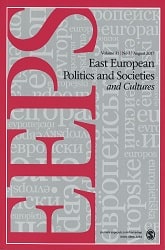Origins, Memory, and Identity: “Villages” and the Politics of Nationalism in the Republic of Moldova
Origins, Memory, and Identity: “Villages” and the Politics of Nationalism in the Republic of Moldova
Author(s): Jeniffer R. CashSubject(s): Political history, Government/Political systems, Nationalism Studies, Rural and urban sociology, Post-War period (1950 - 1989), Transformation Period (1990 - 2010), Sociology of Politics, Identity of Collectives
Published by: SAGE Publications Ltd
Keywords: Moldova; national identity; rural-urban identities; memory;
Summary/Abstract: This article reconsiders the manifestation of nationalism in the Republic of Moldova during the late Soviet period and early 1990s. Whereas dominant approaches have focused on the ethnic dimensions of the national movement, I argue that rural-urban identities also played a significant role in shaping political events and outcomes of the recent past by drawing on ethnographic research among participants in the “folkloric movement” within the arts and performance world. This movement coincided with the broader national movement of the 1980s and demonstrates the centrality of “villages” in the construction of an anti-Soviet “national” identity among ethnic Moldovans. In conclusion, the politics of nationalism must be understood in a wider framework that also accounts for the importance of non-ethnic forms of collective identity, such as villages, and that investigates how individual origins and social memory shape civic and political participation.
Journal: East European Politics and Societies
- Issue Year: 21/2007
- Issue No: 04
- Page Range: 588-610
- Page Count: 23
- Language: English
- Content File-PDF

